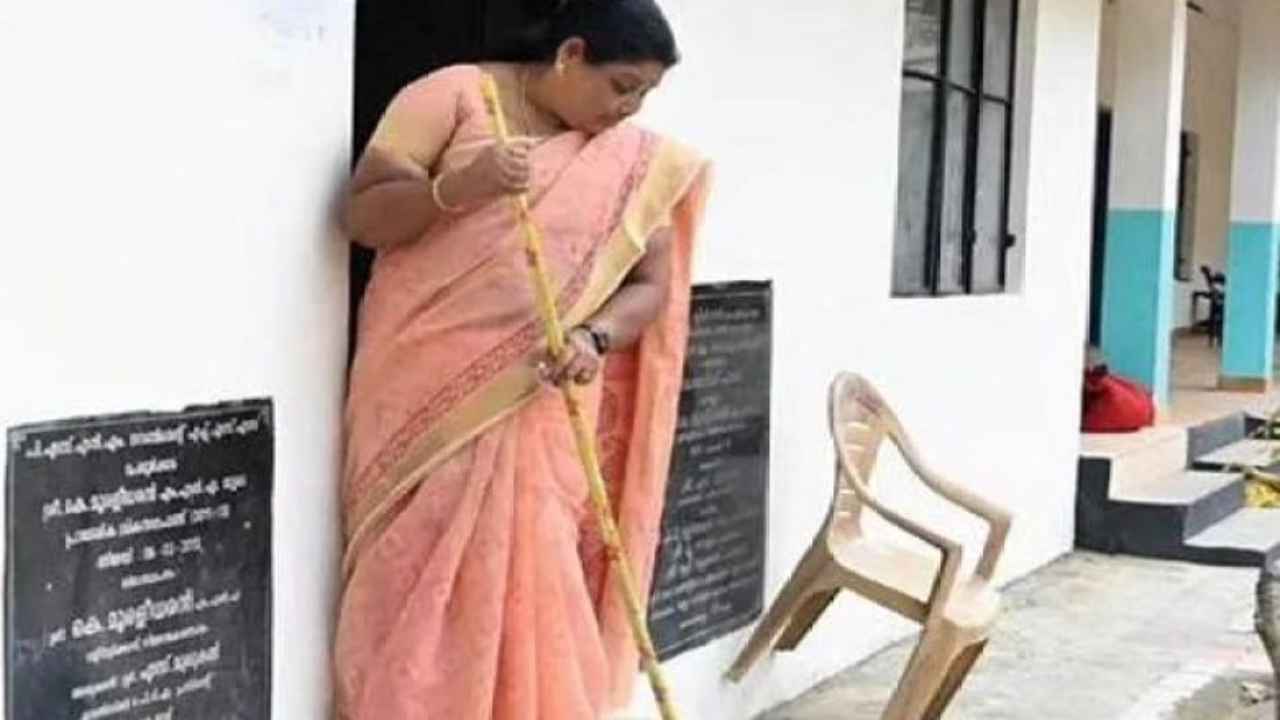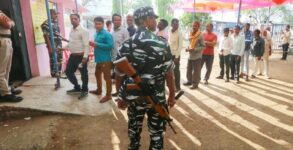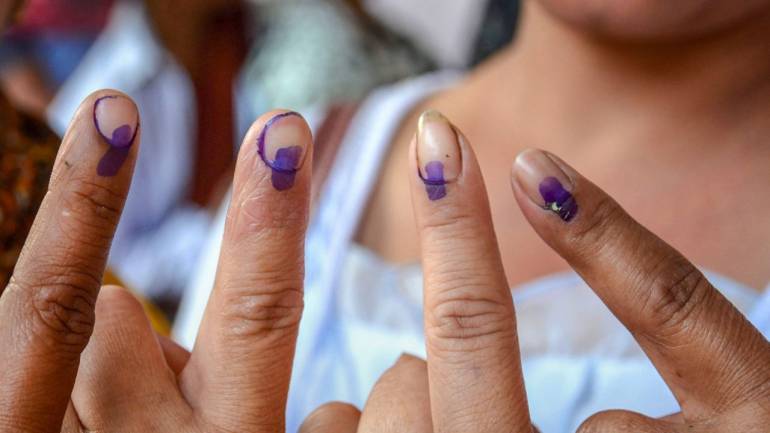KR Ushakumari went to school when it was reopened after the annual summer vacation last week, just like she did in the last two decades.
But, things were not all the same for her this time because instead of books, duster and chalk, she was armed with a broomstick, floor scrubber and mop at the new school and the esteemed tag of a ‘teacher’, which she had been cherishing as a treasure all these years, was lost forever.
After 20 long years of service of teaching in an uphill tribal school in remote Kunnathumala in the district, the woman is not a teacher now but a part-time sweeper at a government school in state capital Thiruvananthapuram.
She was one among the 344 ”vidya volunteers”, the single teachers working in Multi-Grade Learning Centres (MGLC) in the tribal and other backward areas who have now been appointed as part-time or full-time sweepers in various state-run schools as part of a rehabilitation programme of the state government.
Though she was on the verge of tears, a mature Ushakumari said she was never ashamed of being a sweeper and believes that every job has its own dignity.
”In my tribal school also, I had to sweep the premises and dust the classroom for several days when the helper could not turn up. How many days have I cooked meals for my children besides teaching them. I consider my new job as a blessing only…the only thing is I miss my teacher tag and my students,” Ushakumari told PTI.
According to official sources, the appointments were made to support these academic instructors who otherwise would have become unemployed as the MGLCs were shut down by the government on March 31 this year.
The centres were closed as part of plans to give those children studying there better education facilities and exposure by accommodating them in the nearest public schools, they said.
A recent government order, issued by Principal Secretary (General Education) Mohammed Hanish, said 344 vidya volunteers, who had been working on contract basis for over 10 years, would be appointed in Part-Time Contingent Menial (PTCM) / Full-Time Menial (FTM) posts under the General Education department based on their consent and seniority.
Among them, at least 50 such vidya volunteers have taken up the job of part-time or full-time sweepers in various government schools across the state when the new academic year began last week, as per sources.
Ushakumari said it had been a long-pending demand for her and several other academic instructors to get their contract job regularised and secure the benefits of a government employee.
Since there were technical limitations to appoint them as teachers in the state sector as many of the academic instructors had completed Class 10 or Class 12, the government has decided to appoint them as part-time or full-time sweepers with a pay scale of Rs 23,000-50,200.
Ushakumari, who was appointed at PSNM Higher Secondary School at nearby Peroorkkada from June 1, said her monthly salary as vidya volunteer was just Rs 18,500 and that too was not regular.
”That’s why I am seeing my sweeper job as a blessing. I do not want to depend on my family and be a burden on them for my needs,” she said.
The 54-year-old woman, meanwhile, said she was surprised to know that many teachers and other staff in her new school have recognised her from the old news articles and television stories, which featured her tedious daily journey driving a scooter, rowing a boat and then trekking a dense forest path to reach the remote tribal school.
Located at Kunnathumala in Agasthyamala Biosphere Reserve, the Agasthya MGLC had been a solace for the tribal children living in the surrounding settlements since it was established in 1999 for primary classes 1 to 4.
After teaching in a single-teacher school in Kottoor for two years, Ushakumari had joined this school in the reserve forest in 2002 and since then this was all that her life revolved around.
A native of Amboori village, over 40 kms away from here, she used to begin her daily journey to school by 7.30 in the morning. After travelling on her two-wheeler to reach Kumbikkal Kadavu, a local river bank, she would take a boat to reach the shore across the water body.
If there was no other passenger, she wouldn’t mind rowing the wooden country boat herself and reach the other side, from where she had to trek several kilometres up through the forest path to reach the school, where five to seven children would be waiting for her arrival.
”The trekking was alright in the initial two-three kilometres. But, the path, by the side of solid rocks, was too steep in the rest of the distance. I used to walk holding a stick in my hand,” she said.
Besides teaching various subjects including Maths and English, the woman, who has passed Class 12, also had to multitask by taking up the job of a cook, helper and even principal at the tiny tin-roof school whenever the circumstances demanded.
After all the hectic travel and work, she would reach back home by 8-8.30 in the night.
”My knees still have severe pain due to the hazardous trekking. But, however much tough it was, I am very happy and satisfied while looking back. I could teach over 200 tribal children during my service who would have otherwise not have been initiated into the world of letters,” she said.
The ”teacher” said many of her students, who later completed higher education and got employed in various places, were not happy for her to take up the sweeping job.
Her own family, including husband and two children, were also not keen on her joining the new school as a sweeper after years-long service as a teacher.
”But, I told everyone that I am happy with what I am doing. If I did not get this job, what would I have done? My only plea to the government now is to give people like me full pension considering our years of service in the tribal school,” she said.
Only those having 20 years of service are eligible for full pension in the government sector but she has only five more years service as sweeper.
Another teacher-turned sweeper, who does not want to be quoted, shared the same concern.
”We have no complaint with our designation as sweeper. But, the only plea is to give us a full pension considering the effort we put in for educating backward children,” he told PTI.
The reports about the sweepers’ post given to academic instructors like Ushakumari have triggered sharp reactions on social media, following which General Education Minister V Sivankutty reacted by rejecting the criticism saying the netizens’ charges were baseless.
He said the LDF government has actually ensured permanent employment and job security for the vidya volunteers, including Ushakumari, when these centres were shut down.
It was done with their consent and based on the seniority of their appointment as academic instructors in the centres, he said.
There were seven students in the Agasthya MGLCs and steps were taken to shift them to the two nearest schools, he further said.
”The state-run schools have become hi-tech and centres of excellence nowadays with improved infrastructure and other physical facilities. In this circumstance, we think those children studying in the single-teacher schools, where there is no other facility, also should experience the same like other mainstream children,” the minister said.
The government, thus, decided to close down 243 MGLCs and retain 27 similar centres considering some other regional and geographical factors. Sivankutty added.
There were a total of 3,818 students in 270 single-teacher schools in 11 districts of the state till now.
The MGLCs had been set up in Kerala in 1997, under the District Primary Education Programme (DPEP) scheme, to bring the children hailing from marginalised and educationally backward areas like coastal and tribal regions into the mainstream society.


















